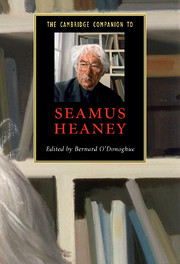Book contents
- Frontmatter
- 1 Introduction
- 2 Seamus Heaney’s Working Titles
- 3 The Context of Heaney’s Reception
- 4 Heaney in Public
- 5 Heaney and the Feminine
- 6 Heaney and Eastern Europe
- 7 Heaney’s Classics and the Bucolic
- 8 Professing Poetry
- 9 Heaney and the Irish Poetic Tradition
- 10 Irish Influence and Confluence in Heaney’s Poetry
- 11 Heaney and Yeats
- 12 Heaney’s Wordsworth and the Poetics of Displacement
- 13 Heaney, Beowulf and the Medieval Literature of the North
- 14 Crediting Marvels
- Guide to Further Reading
- Index
1 - Introduction
Published online by Cambridge University Press: 28 March 2009
- Frontmatter
- 1 Introduction
- 2 Seamus Heaney’s Working Titles
- 3 The Context of Heaney’s Reception
- 4 Heaney in Public
- 5 Heaney and the Feminine
- 6 Heaney and Eastern Europe
- 7 Heaney’s Classics and the Bucolic
- 8 Professing Poetry
- 9 Heaney and the Irish Poetic Tradition
- 10 Irish Influence and Confluence in Heaney’s Poetry
- 11 Heaney and Yeats
- 12 Heaney’s Wordsworth and the Poetics of Displacement
- 13 Heaney, Beowulf and the Medieval Literature of the North
- 14 Crediting Marvels
- Guide to Further Reading
- Index
Summary
When Seamus Heaney was awarded the Nobel Prize for Literature in 1995, the citation famously paid tribute to his combination of ‘lyrical beauty and ethical depth which exalt everyday miracles and the living past’. This captures with remarkable economy not only Heaney’s pre-eminent strengths, but also the two imperatives between which his own commentary and the criticism of him have fluctuated. In the Preface to Finders Keepers: Selected Prose 1971–2001 Heaney described the choice between the ethical and the aesthetic again, quoting from his Foreword to the prose collection Preoccupations in 1980: ‘How should a poet properly live and write? What is his relationship to be to his own voice, his own place, his literary heritage and his contemporary world?’ By quoting the earlier Foreword verbatim, Heaney was making it clear that his abiding concerns have remained unchanged.
The Nobel citation also summarises the issues that this book aims to account for. Heaney’s most recent collection of poems District and Circle (2006) – and Heaney’s titles are carefully considered, as Rand Brandes’s essay here shows – marks a point, forty years on from his first full-length volume Death of a Naturalist, at which he circles back to the local district in which that highly localised volume was placed. In those forty years Heaney has published at least twelve major individual volumes of poems, three series of Selected Poems, several dramatic translations and a large body of critical prose. Not surprisingly, taking stock is not a simple matter: by now, in 2008, there is a very considerable bibliography on him to account for, as well as his own works, and several critical approaches of varying schools of thought and degrees of approval.
- Type
- Chapter
- Information
- The Cambridge Companion to Seamus Heaney , pp. 1 - 18Publisher: Cambridge University PressPrint publication year: 2008

